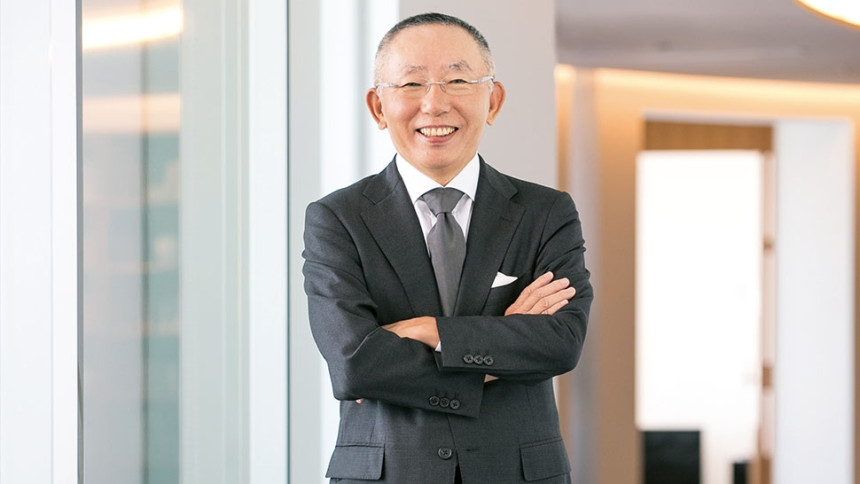
Tadashi Yanai & Family Net Worth and Success Story
Tadashi Yanai is a name that stands out in the global fashion industry. As the founder and president of Fast Retailing, the parent company of Uniqlo, Yanai has built one of the largest and most influential clothing empires in the world. His journey from a small town in Japan to becoming one of the richest individuals in the world is a testament to his entrepreneurial spirit, innovative thinking, and relentless drive. This comprehensive account explores Tadashi Yanai's early life, the rise of Uniqlo, his business strategies, financial success, and his family's legacy.
Early Life and Background
Tadashi Yanai was born on February 7, 1949, in Ube, Yamaguchi Prefecture, Japan. He grew up in a modest family, with his father running a small clothing store called "Men’s Shop Ogori Shoji." This early exposure to the retail business sparked Yanai's interest in the industry. However, his initial aspirations were not centered on fashion; he graduated from Waseda University in Tokyo with a degree in economics and political science in 1971.
After graduation, Yanai briefly worked at a supermarket chain called Jusco (now known as Aeon). However, he quickly realized that he wanted to forge his own path and decided to return to his hometown to join his father’s business. This decision marked the beginning of Yanai's journey in the retail industry, where he would eventually transform a small family shop into a global powerhouse.
Founding of Uniqlo
In 1984, Tadashi Yanai rebranded his father's business and opened the first Uniqlo store in Hiroshima. The name "Uniqlo" is derived from "Unique Clothing Warehouse," reflecting Yanai's vision of creating a unique shopping experience. The store's concept was revolutionary at the time: offering affordable, high-quality casual wear in a clean, self-service environment. This concept resonated with consumers, and Uniqlo quickly gained popularity.
Uniqlo’s business model was inspired by Yanai's observations of successful retail chains in the United States and Europe, such as GAP and Zara. He adopted a fast fashion approach, emphasizing rapid production, efficient supply chain management, and continuous product innovation. Uniqlo's focus on basics and functional clothing also set it apart from other fashion brands, catering to a broad demographic.
Expansion and Global Reach
The success of the first Uniqlo store paved the way for rapid expansion across Japan. By the early 1990s, Uniqlo had become a household name, with dozens of stores nationwide. Yanai's vision, however, extended beyond Japan's borders. In 2001, Uniqlo opened its first overseas store in London, marking the beginning of its global expansion.
The international journey was not without challenges. Initial attempts to enter markets like the United States and China faced setbacks due to cultural differences and competition. However, Yanai's resilience and willingness to adapt led to eventual success. By focusing on localization strategies, such as understanding local consumer preferences and adjusting product offerings, Uniqlo managed to establish a strong presence in various international markets.
Today, Uniqlo operates over 2,200 stores in more than 25 countries, including major markets like China, the United States, Europe, and Southeast Asia. The brand's global success can be attributed to its consistent focus on quality, affordability, and innovation.
Business Strategies and Innovations
Tadashi Yanai's success with Uniqlo is rooted in several key business strategies and innovations that have set the brand apart from its competitors.
- Lifewear Philosophy: Uniqlo's "Lifewear" concept focuses on creating clothing that improves the everyday life of its customers. This philosophy emphasizes functionality, comfort, and timeless design, ensuring that Uniqlo's products remain relevant across different seasons and trends.
- Technological Innovation: Uniqlo invests heavily in technological innovation to enhance its products. Notable examples include the development of HEATTECH, a fabric that generates and retains heat, and AIRism, a moisture-wicking material designed for comfort. These innovations have become signature elements of Uniqlo's product offerings.
- Efficient Supply Chain: Uniqlo's efficient supply chain management is a critical factor in its success. The company employs a "SPA" (Specialty store retailer of Private label Apparel) model, which integrates design, production, and retail. This approach allows Uniqlo to maintain high quality and control costs, enabling it to offer affordable prices.
- Collaboration with Designers: Uniqlo has collaborated with renowned designers and brands, such as Jil Sander, Alexander Wang, and JW Anderson, to create exclusive collections. These collaborations bring a fresh perspective to Uniqlo's offerings and attract fashion-conscious consumers.
- Customer-Centric Approach: Yanai's emphasis on customer satisfaction is evident in Uniqlo's operations. The company continuously gathers feedback and data to improve its products and services. This customer-centric approach has helped Uniqlo build a loyal customer base worldwide.
Financial Success and Net Worth
Tadashi Yanai's strategic vision and leadership have translated into substantial financial success. As of 2024, his net worth is estimated to be around $33 billion, making him one of the wealthiest individuals in Japan and the world. His wealth is primarily derived from his substantial ownership stake in Fast Retailing, the parent company of Uniqlo.
Fast Retailing's financial performance has been impressive over the years. The company's revenue exceeded $21 billion in the fiscal year 2023, with a significant portion coming from its international operations. Uniqlo's ability to adapt to changing market dynamics, coupled with its focus on innovation and efficiency, has driven consistent revenue growth and profitability.
Challenges and Controversies
Despite its success, Uniqlo and Fast Retailing have faced several challenges and controversies. The company has been criticized for labor practices in its supply chain, including allegations of poor working conditions and inadequate wages in factories producing Uniqlo products. In response, Fast Retailing has taken steps to improve transparency and enforce stricter labor standards, including regular audits and collaboration with non-governmental organizations (NGOs).
Additionally, Uniqlo's rapid expansion has occasionally led to issues with inventory management and overexpansion in certain markets. However, Yanai's pragmatic approach and willingness to address these challenges have helped Uniqlo navigate through difficult periods and maintain its growth trajectory.

Philanthropy and Social Responsibility
Tadashi Yanai is also known for his philanthropic efforts and commitment to social responsibility. He believes in using his wealth and influence to make a positive impact on society. Through the Yanai Tadashi Foundation, he has supported various initiatives in education, disaster relief, and community development.
In 2011, following the devastating earthquake and tsunami in Japan, Yanai donated approximately $12 million to support relief efforts. He has also contributed to educational programs, including scholarships for underprivileged students and funding for research institutions.
Fast Retailing has implemented several sustainability initiatives to reduce its environmental impact. These include efforts to minimize waste, use sustainable materials, and promote recycling through programs like the "All-Product Recycling Initiative," where customers can return used clothing for recycling and repurposing.
Personal Life and Values
Despite his immense wealth and influence, Tadashi Yanai is known for his humble and down-to-earth personality. He maintains a low profile and prefers to stay out of the public eye, focusing on his work and family. Yanai is married and has two sons, who are gradually becoming involved in the family's business operations.
Yanai's values of hard work, perseverance, and integrity have been key drivers of his success. He believes in leading by example and fostering a culture of innovation and excellence within his company. His dedication to continuous improvement and learning has been instrumental in Uniqlo's rise to global prominence.
Legacy and Future Outlook
Tadashi Yanai's legacy is defined by his remarkable journey from a small-town clothing store to building a global fashion empire. His contributions to the retail industry, particularly through the creation and growth of Uniqlo, have left an indelible mark on the global fashion landscape.
Looking to the future, Fast Retailing is well-positioned to continue its growth and expansion. The company's focus on innovation, sustainability, and customer-centricity will enable it to navigate evolving market trends and capitalize on emerging opportunities. Yanai's vision of creating high-quality, affordable clothing that enhances everyday life will continue to guide Uniqlo's strategic direction.
Conclusion
Tadashi Yanai's success story is a testament to the power of vision, innovation, and strategic thinking. From his early days in a small clothing store to building a global fashion empire, Yanai has demonstrated remarkable entrepreneurial prowess and leadership. His ability to identify opportunities, execute large-scale projects, and adapt to changing market dynamics has been instrumental in his rise to prominence.
Yanai's commitment to philanthropy, social responsibility, and using business as a force for good reflects his values and vision for a better future. As he continues to influence the retail industry and inspire future generations of entrepreneurs, Tadashi Yanai's legacy will be remembered as a pioneering force that transformed the way people shop for and wear clothing.
The story of Tadashi Yanai and his family is not just about business success; it is about resilience, innovation, and making a positive impact on society. His journey from humble beginnings to becoming one of the world's wealthiest individuals is a source of inspiration and a reminder of the limitless possibilities that can be achieved through hard work, determination, and a commitment to excellence.





